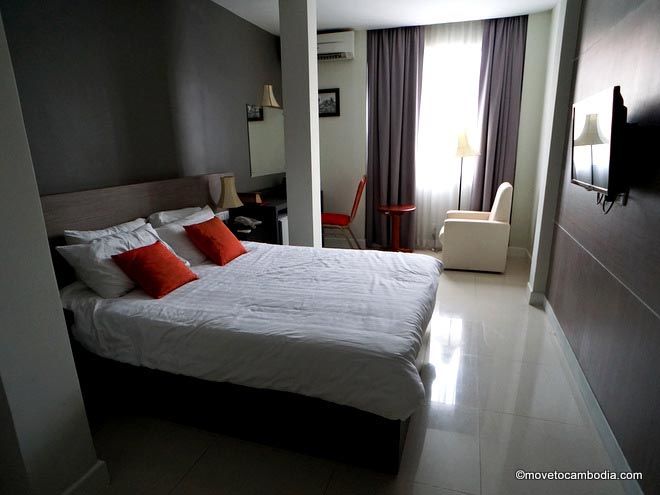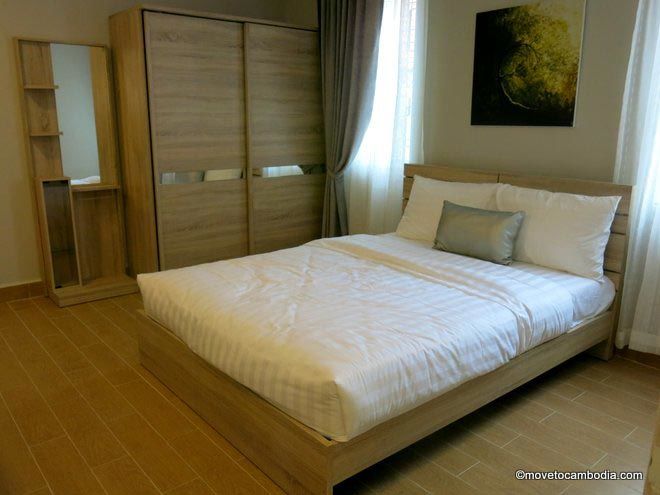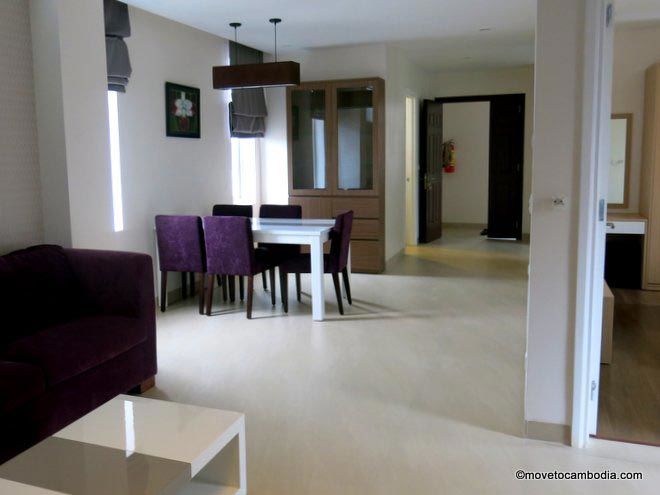Today we talk to Chris Desaulniers, the co-founder of Elevated Realty*. He’s given us the low-down on some of your burning real estate questions (and if you have more, please feel free to leave them in the comments).

Looking for a place to live?
What is the difference between different types of serviced apartment and how do they compare to furnished and unfurnished apartments?
“Though many apartments in Phnom Penh call themselves serviced, there is a distinction between an apartment providing services and a fully-serviced apartment. A fully-serviced apartment is comparable to a hotel, providing everything you need to live comfortably. You can expect that it will be completely furnished, decorated and contain all necessary household appliances. This includes linens, a fully outfitted kitchen, and concierge service. In these types of apartments rates are generally all-inclusive; providing cable, internet, water, cleaning, parking, and often electricity as part of the rent. Fully-serviced apartments are typically meant to be alternatives to a hotel when your stay will be slightly longer than a typical hotel stay, but not long enough to sign a lease, though they can also be used for long-term living. However, the price tag attached will be in line with the services being provided.
Recently, many apartments in Phnom Penh apartments have started including some services and amenities as part of a monthly rental fee. It has become standard for mid-range to high-end apartments to be furnished but they will not usually include small kitchen appliances, dishes, utensils, linens, or other household items. Many of these apartments will provide Internet, cable, water, and cleaning in the monthly rental rate. Electricity is very rarely included as a part of the monthly rate.
At the lower end of the market in Phnom Penh are flats or unfurnished apartments, flats being a floor of a shophouse or villa that have been converted into a private apartment. These places usually have sparse furnishings (think rattan) and will often not include any services such as internet, cable and the like.”

Is it a hotel? No, it’s a Phnom Penh serviced apartment.
What are common services and facilities included with properties, and how should an export value those amenities?
“The most common services that are often included in many Phnom Penh apartments are Internet, cable and cleaning. Having these services included as part of your monthly rental rate has several advantages.
Firstly the value of the services themselves. If sourced individually, Internet will cost a minimum of $15/month, basic digital cable will cost $10/month (plus a $49 installation fee), and cleaning twice a week will cost on average $50/month. Having your landlord deal with the various service providers and installations will save you time and spare you headaches.
Moreover, if there are service interruptions or issues that arise in the future the owner or property manager will resolve these on your behalf (oftentimes proactively because they are affected by the outages, too). Additionally, having services included means not having to deal with billing or making payments at the various offices. On the whole, included services can save expats time and energy.
In addition to services, many apartment buildings now have facilities such as fitness centers, swimming pools, and sauna/steam rooms. Though these things are luxury amenities, having easy accessibility to these types of facilities can automatically have an impact on your lifestyle and well being. Whereas without it, your other options are limited. The alternative is signing up for a membership at a Phnom Penh gym for between $40 and $60 a month (and up). Alternatively, if the property which you are renting at has these facilities at your fingertips there is immediate value in it’s convenient and at no additional cost.
In total, these services (Internet, cable, cleaning, and fitness membership) can add up to $135 a month or more. This, along with the time and energy saved, should be taken into consideration when deciding between apartments.”
What is the value of a longer-term lease versus a short-term lease?
“Many expats are living in Cambodia only temporarily and are nervous about signing long-term leases whereas most landlords are unwilling to have tenants stay for less than six months.
Signing a six-month or year lease is beneficial because it locks in a rental price in a market that is only going up. Rental prices are currently rising by 10-15% annually, and with the high influx of new buildings offering the aforementioned amenities, you can expect that prices will continue to rise.
Many expats who have been here for a number of years are caught off-guard when their lease term ends and they are unable to find an apartment of the same value for the same price. Signing a long-term lease also gives you more negotiating power, if there are any requested changes at the time of signing a landlord is more likely to be flexible with you if they know you are going to stay for a longer period of time. It is about relationship building, most owners wants to build and maintain a relationship with their tenants. Settling into a place allows you to create a home away from home, make your apartment your own and integrate into the community around you.”

If you lived here, wouldn’t you want a long-term lease?
When signing a long-term lease, what sort of changes can reasonably be negotiated with the landlord?
“Most everything in Cambodia is negotiable, and that includes rental housing. Often the most important item for expats is monthly rental price, and there is almost always some flexibility in it. Other things that are within reason to negotiate with the landlord include the installation of window screens, fans, removal of furniture so the space can alternatively be used for a home office or other purpose. Willingness to negotiate depends on the owner, of course, but generally reasonable requests can be accommodated. If you have an extensive list of changes, though, be prepared to meet in the middle.”
What is the value to use a reputable agency rather than searching on your own?
“There is great value in using a reputable real estate agency. They are experts at what they do and possess the knowledge to understand your housing requirements and the market. They are able to advise and drive your property search in the most efficient manner. When moving to an unfamiliar city or country, it is an asset to have someone to help you navigate the city and the marketplace. Additionally they will negotiate on your behalf, draft and facilitate a fair lease agreement, and ensure all your expectations are met before, during, and after move-in.
Agencies provide service at no charge to the client, a commission is paid to the agency by the property owner, and this fee is generally standardized. Although the commission is paid by the landlord, good agencies are loyal to their customers as well because they depend on word of mouth for their business. A reputable agency will be showing you properties that best match your requirements, and not show favoritism between properties. If you find that you are consistently being shown properties that do not suit your needs, you should look for another agency. Most of the reputable agencies in Phnom Penh are privy to the same properties and will get you the exact same rate. Their objective is to make your search efficient and clear. You should choose an agency that you feel comfortable with and that understands your requirements. The experience should be fun.
The alternative to using an agency in Phnom Penh is to tackle it independently, which may be best for those on a very tight budget. This includes attempting to weed through the various housing options and levels of standard, cross a language barrier and invest the time to embark on this undertaking on your own. Though many hidden gems can be found this way, it may not be advantageous for someone coming into an unfamiliar country and is not accustom to the culture and norms.”
*Elevated Realty is no longer in business.
Congratulations to Chris,Leah,and Ron on your accomplishments in the realestate field.I read some things people posted.Expats really aren’t the reason things are becoming more expensive in Phnom Penh or other areas of Cambodia.Its investment from outside sources, mainly the Chinese government that’s driving prices up.Sihanoukville is a prime example of high rises and casinos being built.Regardless of which outside country is investing, Cambodia desperately needed a boost economically.I’m a retired American thinking about retiring in Phnom Penh this year but I haven’t decided yet. Respectfully yours, Eddie
I am wondering how expensive water and electricity are in Phnom Penh.
Thank you
In Cambodia, the government buy electric power from Vietnam 0.14$/kwh and sold out 0.20$/kwh. The landlords charge 0.25$/kwh-0.30$/kwh from their tenant. Why? They got nothing from this charge. They pay it for elevator or other public lighting in the apartment.
Not true. Even in buildings with no public lighting, they charge the extra fee. And even when there is public lighting, charging an extra 30% for every resident is ridiculous because that is far more than the cost to the landlord. It’s a way for landlords to make extra money and nothing more.
I want Cambodia to stay Cambodia. I want it to fourish but I dont see how bougie hamburger joints and starbucks that 99% of locals will never be able to afford are helping Cambodia. You may think that I wish that the country does not flourish and I find that a little presumptive of you since you do not know me. I am seeing the good people of Cambodia losing their identity because of hippie middle aged people like yourself that think they are saving a country when in reality you are creating a place where locals do not want to live because it is not Cambodia anymore. I feel it sad that Cambodia is losing its heritage and culture little by little. See I want to live in the country that they want to live in not a copy of china town or san francisco.
As I said, I don’t think that expats are what is causing prices to rise in Cambodia, the pace of development is what’s causing the prices to rise. If you’ve been to the high-end coffee shops in Phnom Penh, you’ll notice that the customers are primarily middle class Cambodians, not hipsters or hippie middle-aged people like myself.
I think the influx of ex pats to the area is ruining cambodia. Costs are going up at an alarming rate. I used to pay $25.00 to go from PP to SR. Many hotels were to be had a $7. now its over $100 to fly and hotels mostly start at min 25.00 now I am worried. I planned to go to PP and retire and just teach english with my measley 1000 a month retirement as insurance but it is looking as if that is not longer possible.
You’ve mentioned this before, Matthew. The influx of expats is not what’s causing prices to rise in Cambodia, the pace of development is what is causing prices to rise. You wishing that the country won’t develop and Cambodians stay poor so that you can afford to retire here is a little bit selfish, don’t you think?